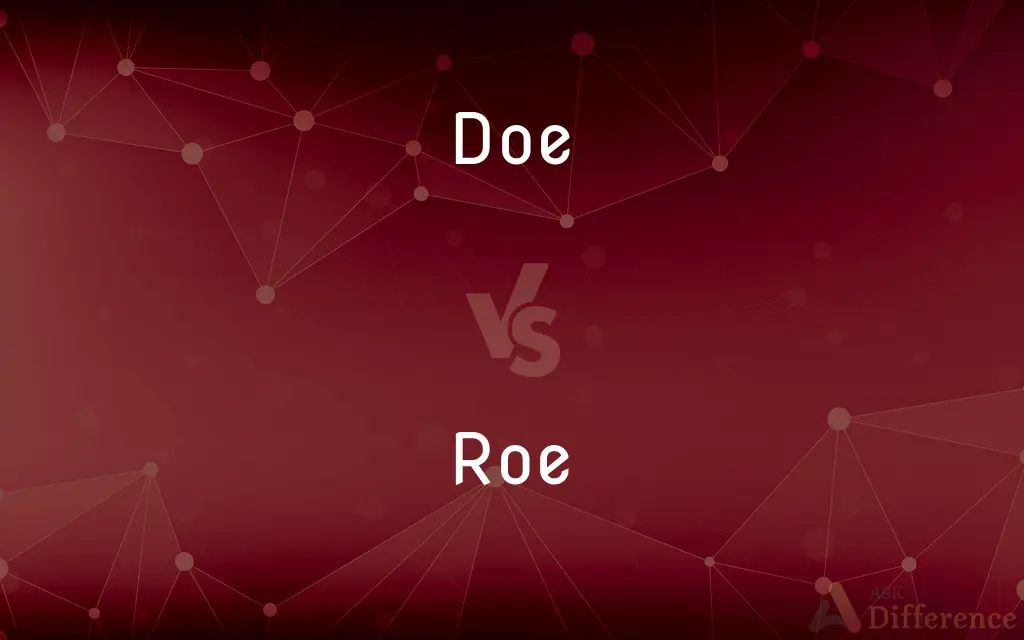Doe vs. Roe — What's the Difference?
By Maham Liaqat & Urooj Arif — Updated on April 24, 2024
Doe often refers to an anonymous female in legal or formal contexts, while Roe typically denotes a party in legal cases about abortion rights.

Difference Between Doe and Roe
Table of Contents
ADVERTISEMENT
Key Differences
Doe is commonly used as a pseudonym for an unidentified female in legal cases or documents, ensuring anonymity and privacy. On the other hand, Roe is famously associated with the pseudonym "Jane Roe" used in the landmark U.S. Supreme Court case Roe v. Wade, which addressed women's legal rights to abortion.
In legal documentation and reports, Doe might be used to refer to a generic or unknown person when gender specifics are necessary. Whereas, Roe, although also used generically, is heavily tied to discussions and legal precedents concerning reproductive rights.
Doe can be applied in various legal and medical contexts to protect an individual’s identity, such as in the cases of unclaimed bodies or patients with confidentiality concerns. Conversely, Roe has become emblematic of anonymity in the specific context of abortion rights advocacy and related legal battles.
When used in educational and hypothetical legal scenarios, Doe helps illustrate general legal principles without revealing real identities. On the other hand, Roe is often specifically used to discuss or teach issues related to privacy and women's rights within the legal framework.
Beyond legal contexts, Doe is also part of the broader usage in phrases like "John Doe" or "Jane Doe," which represent average persons. Roe, however, does not share this broader application and remains strongly associated with its original legal context.
ADVERTISEMENT
Comparison Chart
General Usage
Anonymous female identifier
Specifically linked to abortion rights cases
Legal Context
Used in various legal documents
Associated primarily with Roe v. Wade
Implications
Identity protection
Legal rights and privacy in abortion debates
Broader Cultural Association
Generic, average person
Strongly tied to a specific legal case
Educational Use
Illustrates legal principles
Used in discussions on women's rights and privacy
Compare with Definitions
Doe
A pseudonym used for an unidentified or anonymous female in legal contexts.
The case was filed under Jane Doe to protect the plaintiff's identity.
Roe
Symbol for anonymity in the context of sensitive legal matters.
Roe's identity was protected throughout the proceedings.
Doe
Generic term for an average woman in hypothetical scenarios.
In the scenario, Jane Doe decides to invest her savings.
Roe
Pseudonym used in the landmark Supreme Court case Roe v. Wade.
Roe became a pivotal figure in the fight for abortion rights.
Doe
Used in describing unclaimed or unknown bodies in a medical or legal context.
The hospital reported the arrival of a Jane Doe last night.
Roe
Associated with discussions on women's rights.
Roe has become synonymous with women's struggle for reproductive autonomy.
Doe
Symbolic for privacy concerns in legal battles.
Jane Doe was used as the plaintiff's name to ensure confidentiality.
Roe
Represents a party in legal debates concerning reproductive rights.
Roe is often cited in cases challenging state abortion laws.
Doe
Represents a female in teaching law or procedures.
The law students practiced with the case of Jane Doe.
Roe
Used educationally to discuss privacy and legal rights.
Roe v. Wade is a staple in constitutional law courses.
Doe
A female deer, especially a female roe, fallow deer, or reindeer.
Roe
Roe () or hard roe is the fully ripe internal egg masses in the ovaries, or the released external egg masses of fish and certain marine animals, such as shrimp, scallop, sea urchins, and squid. As a seafood, roe is used both as a cooked ingredient in many dishes and as a raw ingredient.
Doe
A female deer.
Roe
The eggs or spawn of a fish, contained within or separated from the ovary, especially when prepared as food. Also called hard roe.
Doe
The female of various other mammals, such as antelopes, kangaroos, mice, or rabbits.
Roe
The milt-containing testes of a fish, especially when prepared as food. Also called soft roe.
Doe
A female deer; also used of similar animals such as antelope, (less commonly goat as nanny is also used).
Roe
The eggs or gonads of certain marine invertebrates, such as a lobster or a sea urchin.
Doe
A female rabbit.
Roe
The eggs of fish.
Doe
A female hare.
Roe
The sperm of certain fish.
Doe
A female squirrel.
Roe
The ovaries of certain crustaceans.
Doe
A female kangaroo.
Roe
A mottled appearance of light and shade in wood, especially in mahogany.
Doe
A female deer or antelope; specifically, the female of the fallow deer, of which the male is called a buck. Also applied to the female of other animals, as the rabbit. See the Note under Buck.
Roe
A roebuck. See Roebuck.
Doe
The federal department responsible for maintaining a national energy policy of the United States; created in 1977
Roe
The ova or spawn of fishes and amphibians, especially when still inclosed in the ovarian membranes. Sometimes applied, loosely, to the sperm and the testes of the male.
Doe
Mature female of mammals of which the male is called `buck'
Roe
A mottled appearance of light and shade in wood, especially in mahogany.
Roe
Fish eggs or egg-filled ovary; having a grainy texture
Roe
Eggs of female fish
Roe
The egg mass or spawn of certain crustaceans such as the lobster
Roe
The eggs or egg-laden ovary of a fish
Common Curiosities
Is 'Doe' used outside of the United States?
Yes, the term Doe is used in several English-speaking countries to maintain anonymity in various legal and medical contexts.
Why is 'Roe' significant in legal history?
Roe is significant for being used in Roe v. Wade, the Supreme Court case that addressed the legality of abortion and shaped subsequent laws.
How does 'Roe' impact discussions on privacy?
Roe impacts privacy discussions, particularly around medical records and reproductive rights, emphasizing the need for confidentiality in sensitive matters.
What broader cultural implications does 'Doe' have?
Doe represents the everywoman in hypothetical scenarios, often used in illustrations and examples.
Can 'Doe' be used for both genders?
Yes, while 'John Doe' is used for males, 'Jane Doe' is used for females.
Can 'Roe' be used for males?
Roe is generally not used for males and is specifically famous for its association with the female pseudonym in Roe v. Wade.
Is there a scenario where 'Doe' and 'Roe' could be used interchangeably?
While both can anonymize individuals, they are not typically interchangeable due to their specific cultural and legal connotations.
What does 'Doe' typically signify in legal documents?
Doe is typically used as a placeholder name for an anonymous or unidentified female in legal contexts.
How are 'Doe' and 'Roe' different in legal usage?
Doe is broadly used for anonymity in various legal cases, whereas Roe is specifically linked to abortion rights cases.
What is the most famous case involving 'Roe'?
The most famous case involving Roe is Roe v. Wade, a landmark decision in the history of U.S. reproductive rights.
What does 'Roe' symbolize in women's rights movements?
Roe symbolizes the fight for reproductive rights and privacy, often used as a rallying point in women’s rights movements.
How does 'Roe' influence educational contexts?
Roe is frequently used in legal and educational discussions to explore issues of privacy and legal rights concerning abortion.
How are 'Doe' and 'Roe' similar?
Both terms are used to anonymize individuals in legal contexts, though they are associated with different types of cases.
Why might someone be referred to as 'Doe' in medical situations?
In medical situations, someone might be referred to as Doe when their identity is unknown or needs to be protected for privacy reasons.
How do 'Doe' and 'Roe' reflect societal values?
Both reflect societal values concerning privacy and identity protection, though they highlight different aspects of legal and ethical concerns.
Share Your Discovery

Previous Comparison
Captive vs. Prisoner
Next Comparison
Brandy vs. RumAuthor Spotlight
Written by
Maham LiaqatCo-written by
Urooj ArifUrooj is a skilled content writer at Ask Difference, known for her exceptional ability to simplify complex topics into engaging and informative content. With a passion for research and a flair for clear, concise writing, she consistently delivers articles that resonate with our diverse audience.
















































